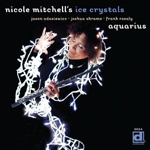|
|
 |
Dusted Reviews
Artist: Nicole Mitchell’s Ice Crystals Album: Aquarius Label: Delmark Review date: Mar. 14, 2013 |

|
|
|
 |
Flautist Nicole Mitchell may have recently headed west for the warmer climes of California, but her latest Delmark venture Aquarius is still very much a Chicago affair. The ensemble name reflects both the wintery certainties of that Midwestern city and the boreal beauty at the root of the band’s sound. Vibraphonist Jason Adasiewicz is the chief reason for the latter distinction and his mallet-meted patterns often supply the bonding agent for Mitchell’s subtly inventive compositions. Coruscating clusters and sustaining swells are recurring call signs to his contributions, and they work exceptionally well in concert with Mitchell’s mercurial leads.
Double bass is just one of the many implements in Josh Abrams’ musical tool bag (as a pair of lauded genre-defying albums for the Eremite label amply demonstrate), but his focus on it here -- plying thick reverberating lines that are right in tune with the city’s past masters running back from Malachi Favors to Wilbur Ware -- is a welcome decision. Drummer Frank Rosaly balances force and grace, often working in close tandem with Abrams to build shifting rhythmic patterns that reveal clever deviations and derivations upon closer inspection. Perhaps most impressive, all four players consistently achieve a full and integrated sound.
Mitchell largely forgoes extended techniques, centering instead on gliding, sonorous runs that thread gorgeously with the creations of her colleagues. “Adaptability” and “Sunday Afternoon” are arguable exceptions to that rule; on the former she adds some electronic echo, and on the latter reveals a harder, funkier intonation that harkens directly back to the maverick artistry of Roland Kirk. That these variations in inflection and tone are only used sparingly only enhances their impact.
The opener “Aqua Blue” nods directly at Herbie Hancock’s classic “Eye of the Hurricane” in its episodic structure and indexing suspensions that signal radiant solos by the leader and Adasiewicz. The effervescent interplay of “Today, Today” and “Yearning” tells even more expansive tales, alternating calming ensemble colloquy with thoughtful solo improvisations. Free textural explorations are the focus of “Diga Diga” and there’s a passage during the lush harmonic forest of “Expectation” that points definitively to the vibraphonist’s exemplary skill as accompanist.
Mitchell’s husband, Calvin Gantt, joins the group for the final piece, an eponymous encomium to departed saxophonist Fred Anderson. The sentiments voiced are simple, but heartfelt, and the piece achieves a visceral ascendancy in its closing-minutes that evokes the soaring, dearly-missed sound of Anderson’s horn. (No coincidence, either, that the album’s street date aligns in close proximity to his third posthumous birthday.) At nearly 70 minutes the program is a bit long-winded in sum, but it’s time definitely well spent.
By Derek Taylor
|







